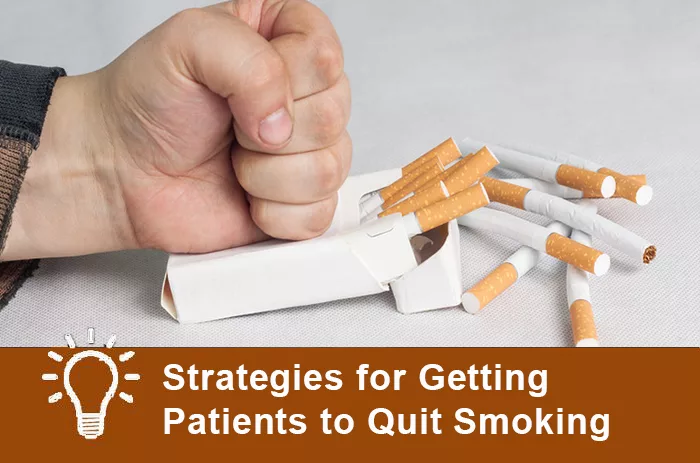For patients who smoke intermittently, you should start with nicotine replacement therapies, such as nicotine lozenges or gum, which can be used on a PRN basis.
Patients who smoke more frequently, such as several times per day, will need consistent nicotine replacement from a patch to prevent the peaks and troughs associated with nicotine cravings. So, consider the following treatments for heavy smokers:
Second line treatment involves one of two medications—bupropion or varenicline (Chantix).
Is varenicline safe to use?
Due to concerns for worsening suicidal thoughts and agitation, varenicline (Chantix) came under scrutiny in 2009. However, a 2016 study comparing the use of these medications to transdermal nicotine and placebo in more than 8,000 smokers with and without psychiatric comorbidities, found no significant difference in psychiatric adverse effects (Anthenelli RM et al, Lancet 2016;387:2507-2520). This provided the FDA with data to remove varenicline’s black box warning. The authors also note significant improvement in abstinence, with varenicline-treated patients 3.6 times more likely to stop smoking than placebo.
Monitor your depressed patients closely while starting treatment and tell them to contact you immediately if they experience sudden changes in mood or have suicidal thoughts.
It’s important to note that most studies showing successful smoking cessation include medications and counseling. Often these counseling sessions are brief, targeted sessions that include cognitive behavioral therapy or motivational interviewing to keep patients engaged in their abstinence plan.
Subscribers to The Carlat Addiction Treatment Report the entire article can read the full article here.
Patients who smoke more frequently, such as several times per day, will need consistent nicotine replacement from a patch to prevent the peaks and troughs associated with nicotine cravings. So, consider the following treatments for heavy smokers:
Second line treatment involves one of two medications—bupropion or varenicline (Chantix).
- Bupropion’s mechanism of action is not known, but it does increase dopaminergic activity, which may or may not relate to its anti-smoking efficacy. Since this medication is effective for both depression and weight loss, it may be a particularly good choice for depressed, overweight smokers. Start most patients at 150 mg in the morning and increase to twice daily dosing as tolerated. Bupropion is well tolerated by most psychiatric patients but try to avoid its use in patients with bipolar disorder type I, who may be more prone to switching to mania. Patients with anxiety disorders can be activated by bupropion—which does not mean you shouldn’t try it, but you should let patients know about that potential side effect.
- Varenicline (Chantix) is the most-effective smoking cessation medication available, but because of potential neuropsychiatric side effects we tend not to use it first line in psychiatric patients. Varenicline works as a partial agonist/antagonist of nicotine receptors. The nicotine stimulation works by stimulating nicotine receptors, blocking the dopamine effects, and thereby decreasing the reward or enjoyment a patient feels when smoking. This decrease in gratification helps curb smoking over time, allowing for more successful cessation.
Is varenicline safe to use?
Due to concerns for worsening suicidal thoughts and agitation, varenicline (Chantix) came under scrutiny in 2009. However, a 2016 study comparing the use of these medications to transdermal nicotine and placebo in more than 8,000 smokers with and without psychiatric comorbidities, found no significant difference in psychiatric adverse effects (Anthenelli RM et al, Lancet 2016;387:2507-2520). This provided the FDA with data to remove varenicline’s black box warning. The authors also note significant improvement in abstinence, with varenicline-treated patients 3.6 times more likely to stop smoking than placebo.
Monitor your depressed patients closely while starting treatment and tell them to contact you immediately if they experience sudden changes in mood or have suicidal thoughts.
It’s important to note that most studies showing successful smoking cessation include medications and counseling. Often these counseling sessions are brief, targeted sessions that include cognitive behavioral therapy or motivational interviewing to keep patients engaged in their abstinence plan.
Subscribers to The Carlat Addiction Treatment Report the entire article can read the full article here.


_-The-Breakthrough-Antipsychotic-That-Could-Change-Everything.webp?t=1729528747)



